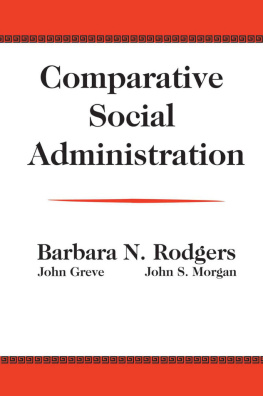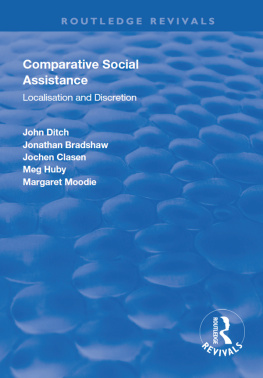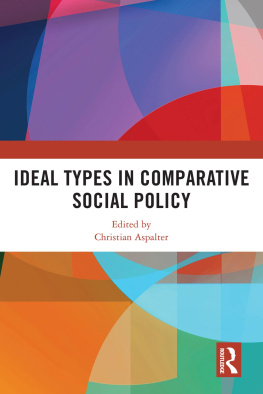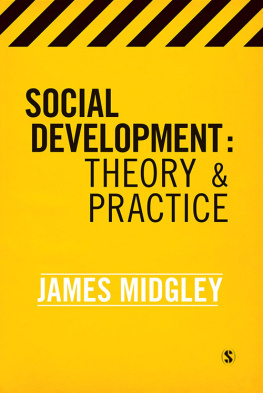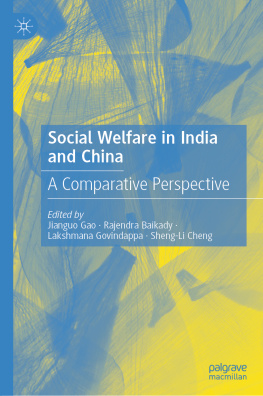Comparative Social Administration
Comparative Social Administration
Barbara N. Rodgers
John Greve John S. Morgan
First published 1968 by Transaction Publishers
Published 2017 by Routledge
2 Park Square, Milton Park, Abingdon, Oxon OX14 4RN
711 Third Avenue, New York, NY 10017, USA
Routledge is an imprint of the Taylor & Francis Group, an informa business
Copyright 1968 by George Allen and Unwin Ltd.
All rights reserved. No part of this book may be reprinted or reproduced or utilised in any form or by any electronic, mechanical, or other means, now known or hereafter invented, including photocopying and recording, or in any information storage or retrieval system, without permission in writing from the publishers.
Notice:
Product or corporate names may be trademarks or registered trademarks, and are used only for identification and explanation without intent to infringe.
Library of Congress Catalog Number: 2006051145
Library of Congress Cataloging-in-Publication Data
Rodgers, Barbara N.
Comparative social administration / Barbara N. Rodgers, John Greve, John S. Morgan.
p. cm.
Originally published: New York: Atherton Press, c 1968.
Includes bibliographical references.
ISBN 0-202-30938-X (alk. paper)
1. Social policy. 2. Public welfareFrance. 3. Public welfareNorway. 4. Public welfareCanada. I. Greve, John. II. Morgan, John S. (John Stewart), 1911- III. Title.
HV25.R63 2007
361.6dc22
2006051145
ISBN 13: 978-0-202-30938-5 (pbk)
My first thanks are due to my collaborators and co-authors, Professor John Morgan and John Greve, who contributed two of the three national case studies, which constitute the first and major part of this essay in comparative social studies. I am grateful to them for joining this venture, for so successfully shaping their studies of the social services of Canada and Norway to fit the purposes of this book, and for their readiness to comment on the early versions of my comparative analysis in . As neither of them was in this country for most of the time that the book was being written, this collaboration presented difficulties which they bore with fortitude. The comparative analysis is considerably better than it would have been without their constructive criticism. Any obscurities, any errors of fact or interpretation which remain are entirely my responsibility.
We should all like to acknowledge the debt we owe to the many people who helped us with the national studies. For my would wish to mention particularly M. Peyssard, late of The Ministry of Health and Population who kindly checked the first version of my French study, and Odette Derrick and the many people to whom she introduced me when I was making a field study of the social services of The Department of Indre-et-Loire.
Similarly John Greve would wish to acknowledge the debt he owes to the several persons at The Ministry of Social Affairs and the National Insurance Institution who contributed material, advice and comment so readily and generously.
John Morgan wishes to express his thanks to all of his colleagues in Canada who assisted him in compiling and correcting the information contained in the section on that country; and particularly the Director of the Research Division of the Department of National Health and Welfare and his staff who devoted an extraordinary amount of time to the review of the material contained in this chapter.
(Each of the authors of sections of this volume is of course responsible for any statements contained in that part of the book for which they are responsible and the good offices of those who have helped them must not be taken as implying responsibility either for factual statements or opinions expressed.)
I should like to thank my colleagues and one ex-colleague, Professor Peter Campbell, now of Reading University, who read various parts of the book and made valuable suggestions and criticisms. I am also much indebted to Vladimir Rys of the International Social Security Association, who directed me towards new sources of information and whose own writings on social security were particularly helpful.
The students who have attended my class in comparative social administration over the years have contributed, probably more than they realize, to this book. They were the reason for my embarking on it; they are largely responsible for the shape it has taken; I only hope that they and their successors will find it serves its purpose as a useful introduction to their comparative studies.
Special thanks are due to Muriel Cocker and Pam Smith, who found time to type successive versions of the manuscript among the many other demands on their time.
Last, but by no means least, I should thank my husband, who has contributedand sufferedmore than most husbands who have wives who write books.
BARBARA N. RODGERS
September 1967
Comparative studies present problems, but they can also be immensely stimulating to those who have studied in any depth some aspect of their own society. Pursued in conjunction with other academic studies they can encourage a more analytical approach to social phenomena, helping the student to see that simple description brings only a limited understanding. For no interesting and valid comparisons are to be found in the mere juxtaposition of parallel descriptions. Comparative studies increase the student's ability to distinguish the general from the specific, if only to identify what is 'generally true' for all countries and what is unique and 'specifically true' to any situation. They permit the cross-fertilization of ideas and encourage creative thinking about new solutions to old problems. Finally, comparative studies, assuming the student has really been able to enter into and work from within a new framework of reference, will often lead to new interpretations and fresh evaluations of social institutions with which he has long been familiar. 'Revaluation is the flower of comparison' wrote Mary Parker Follett.
It is a pity therefore that comparative studies in social administration have not as yet received much attention in British universities, and where a start has been made in the systematic teaching of the subject, teachers and students alike are handicapped by the lack of good studies of social administration in other countries. This is not surprising. Social Administration has only become established as a subject of academic study in the past two decades, and the subject (as a field of study and research) as distinct from the practice of social administration is still only recognized in a few countries.
The boundaries of this field of study may be somewhat ill-defined, but the core of it is well-understood: the development of collective action for social welfarecollective action on the part of government, employers, philanthropic bodies and consumers to meet human needs; in brief, the social services. Again there would be little dispute in this countryspecial provisions for children and families, the aged, handicapped and other socially disadvantaged persons. How far certain aspects of a country's housing, education and employment services are regarded as social service varies. It depends not only on one's criteria but also on the way in which these more 'environmental' services have developed, the extent to which they make special provisions for minority groups and the closeness of their links with the more personal welfare services.

